Egypt: Doing business & staying in touch
Doing business in Egypt
Business culture in Egypt is generally formal, hierarchical and relationship-driven. First meetings tend to focus on establishing trust and personal rapport before moving on to substantive discussion. Handshakes are the standard greeting, often accompanied by polite conversation about family, health or general well-being. Titles and seniority matter, and it is important to address the most senior person first. Business cards are commonly exchanged and should be offered and received with the right hand or both hands.
Meetings may not always begin on time, particularly in larger cities, but punctuality from visitors is still appreciated and seen as a sign of professionalism. Decision-making can be slow, as it often rests with senior management rather than being delegated. Patience is essential, and overt pressure is unlikely to be well received. Dress codes are conservative: men typically wear suits and ties, while women should wear professional attire that covers the shoulders and knees. Modesty and neat presentation are important, even in less formal business settings.
Communication in Egyptian business culture tends to be courteous and indirect. Open confrontation or public criticism is avoided, as maintaining dignity and mutual respect is highly valued. Negotiations may involve repeated discussions and a degree of flexibility, and verbal agreements often precede formal contracts. Hospitality plays an important role, and offers of tea or coffee are a routine part of meetings and should be accepted. Building long-term relationships, rather than focusing solely on immediate outcomes, is often the key to successful business dealings in Egypt.
Egypt has the largest population in the Arab world and one of the most diverse economies in the region. Agriculture remains important, particularly along the Nile Valley, producing cotton, wheat and rice. The country is also a significant producer of natural gas and oil.
The Suez Canal is a vital source of national income, generating revenue from global shipping. Tourism is another key pillar, employing millions and contributing significantly to foreign exchange earnings.
Economic reforms in recent years have focused on infrastructure, energy and attracting foreign investment. While challenges such as inflation and unemployment remain, Egypt continues to play a central economic role in North Africa and the Middle East.
Keeping in Touch in Egypt
Mobile phone coverage in Egypt is generally good in cities, towns and tourist areas, including along the Nile Valley and the Red Sea coast. Coverage can be limited or unreliable in remote desert regions and parts of the Sinai Peninsula. The main mobile network operators are Vodafone Egypt, Orange Egypt, Etisalat Egypt and WE.
Prepaid SIM cards are inexpensive and widely available at airports, official mobile shops and authorised retailers. A passport is required for SIM registration. Data packages are affordable, and 4G services are available in most urban areas. International roaming is supported but can be costly, making a local SIM the preferred option for most visitors.
Internet access is widely available in Egypt, particularly in hotels, cafés, restaurants and airports. Wi-Fi quality varies, with faster and more reliable connections generally found in major cities and tourist accommodations. Mobile data networks provide reasonable coverage for everyday use, though speeds may fluctuate.
Some websites and online services may be restricted, and internet traffic is monitored. Visitors should not expect unrestricted access to all online content. Travellers heading to remote areas are advised to download maps and essential information in advance.
Egypt has a largely state-regulated media environment. Most newspapers, television and radio stations are government-owned or closely monitored. Arabic-language outlets dominate, though English-language publications such as the Egyptian Gazette provide news aimed at expatriates and visitors.
International television channels, including BBC World News, CNN and Al Jazeera English, are available via satellite in many hotels. Social media use is widespread, but visitors should avoid posting content that could be interpreted as politically sensitive or critical of the state, religion or security institutions.








 You know where
You know where